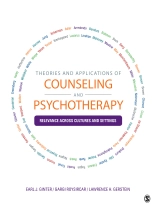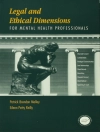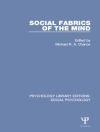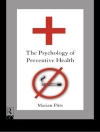Theories and Applications of Counseling and Psychotherapy provides students with the foundational knowledge needed to implement various therapeutic approaches in individual and family counseling. The dynamic author team presents theories through a multicultural and social justice-oriented lens, including evidence to support each theory. Students will embrace chapter concepts through vibrant illustrations and relevant examples from movies, TV shows, photographs, paintings, musical lyrics, news articles, and other sources presented throughout.
قائمة المحتويات
Foreword
Preface
Acknowledgments
About the Authors
Chapter 1. Introduction and Overview
The Start of Contemporary Therapy and Theory
Therapy’s Relationship to Theory
Attributes Used to Judge the Soundness of a Theory
The Authors’ Approach to Writing This Textbook
Connecting the Dots: Seeing the Big Picture
Reappearing Case Study Used in Each Theoretical Chapter
Ongoing Exercise That Concludes in Chapter 15
Chapter 2. Counselor Role and Functions, Professional Ethics, Stress, and Self-Care
Introduction
Professional Ethics
ACA Code of Ethics
APA Ethical Principles of Psychologists and Code of Conduct
Ethical Decision Making: Professional Counselors and Counseling Psychologists
Therapist Well-Being and Burnout
What Is Self-Care?
Chapter 3. Psychoanalytic Theory
Introduction
Historical Context
Sigmund Freud’s Contribution
Basic Concepts
The Therapeutic Process
Beyond Freud
Appropriate Client Populations
Multiculturalism and Social Justice
Limitations and Criticisms of Psychoanalysis
Contemporary Research Support
Relevance of Psychoanalytic Theory
Special Ethical Considerations
Application: Psychoanalytic Theory
Chapter 4. Adlerian Theory
Individual Psychology: An Introduction
Alfred Adler: Inside and Outside the Inner Circle
The Adlerian Approach: Individual Psychology
Major Concepts
Therapy
Research Support
Individual Psychology and Social Justice
Multicultural Perspective
Relevance of the Adlerian Approach
Special Ethical Considerations
Criticisms of the Adlerian Approach
Application: Adlerian Theory
Chapter 5. Existential Theory
Introduction
Key Players of Existentialism
Historical Context
Basic Concepts of Existential Therapy
The Therapeutic Process
Multiculturalism and Social Justice
Ethical Considerations
Evaluating Existential Theory
Limitations and Criticisms of Existentialism
Relevance to Current Practice
Applying Theory to Practice
Chapter 6. Person-Centered Theory
Introduction
Historical Context
Carl Rogers: The Person and Founder of Person-Centered Therapy
Basic Concepts
The Therapeutic Process
Variants and Extensions of Person-Centered Therapy
Multiculturalism and Social Justice
Special Ethical Considerations
Research Support
Limitations and Criticism
Relevance to Current Practice
Applying Person-Centered Theory
Chapter 7. Gestalt Theory
Introduction
Historical Context
Legacy
Basic Concepts
The Therapeutic Process
Limitations and Criticisms of Gestalt Therapy
Application of Gestalt Therapy to Multicultural Populations
Social Justice
Research Support
Relevance of Theory
Special Ethical Considerations
Application: Gestalt Theory
Chapter 8. Behavioral Theory
Introduction
Historical Context
Key Players
Basic Concepts
The Therapeutic Process
Terminology
Multiculturalism and Social Justice
Research: Evaluating Behavioral Approaches
Limitations and Criticisms of Behavioral Approaches
Relevance of Theory
Special Ethical Considerations
Application: Behavioral Approaches
Chapter 9. Cognitive-Behavioral Theory
Introduction
Key Players of Cognitive-Behavioral Therapy
Historical Context
Basic Concepts
The Therapeutic Process
Currently Popular Cognitive-Behavioral Therapies
Multiculturalism and Social Justice
Special Ethical Considerations
Evaluating the Theory
Limitations and Criticisms of the Theory
Relevance to Current-Day Practice
Applying Theory to Therapy
Chapter 10. Reality Therapy and Choice Theory
Introduction
The Roots of Reality Therapy and Choice Theory: William Glasser
Reality Therapy and Choice Theory
Major Concepts
Therapy
Moving Beyond the Reality Therapy of the 1960s
Research Support
Relevance of Theory
Social Justice and Multiculturalism
Criticisms of Reality Therapy and Choice Theory
Application: Reality Therapy and Choice Theory
Chapter 11. Feminist Therapy Approaches
Introduction
Key Players in Feminist Therapy
Historical Context
Basic Concepts
Therapeutic Process
Techniques and Strategies
Multiculturalism and Social Justice
Ethical Considerations
Evaluating Theory
Limitations and Criticisms
Relevance of Theory to Current-Day Practice
Applying Theory to Practice
Chapter 12. Postmodernism: Constructivism and Social Constructionism
Introduction
Key Players of Constructivism and Social Constructionism
Historical Context
Constructivism
Social Constructionism
Narrative Theory
Basic Concepts
The Therapeutic Process
Multiculturalism and Social Justice
Ethical Considerations
Evaluating Theory
Limitations and Criticisms of Theory
Current Mental Health Delivery System
Applying Theory to Practice
Chapter 13. Family Therapy Approaches
Introduction
Returning to the Issue of Defining the Word Family
Family Therapy
Between Family and Individual Therapy: Differences
Family Therapy: Historical Context and Points of Origin
Contemporary Family Therapy
Five Approaches to Family Therapy
Solution-Focused Therapy
Bowen Family Systems Therapy
Structural Therapy
Experiential Approach
Appropriate Client Populations: Family Therapy
Multiculturalism
Social Justice
Special Ethical Considerations
Research Findings
Limitations and Criticisms
Application: Family Therapy
Chapter 14. Multicultural and International Approaches
Introduction
Key Players
Historical Context
Basic Concepts
The Therapeutic Process
Social Justice
Ethical Considerations
Evaluating Theory
Limitations of the Multicultural Theory
Relevance to Current Practice
Applying Theory to Practice
Chapter 15. Moving Toward a Personal Theory of Counseling and Psychotherapy
A Wealth of Theories and Therapies
The Journey to Find One’s Own Theoretical Approach
Elements That Make a Theory a Theory: A Much Maligned Term Defined
The Tangible Value of Operating From a Theoretical Position
Boxing Differences Among the Theories Covered
Common Factors: Corralling Similarities Among the Theories
The Master Therapist: A Blending of Science and Art
Integration’s Role in Constructing a Personal Approach
Future Directions in Counseling and Psychotherapy
References
Index
عن المؤلف
Lawrence H. Gerstein earned a B.B.A. in public administration and a Ph.D. in counseling and social psychology. He is a Ball State University George and Frances Ball Distinguished Professor of Psychology and Director of the Center for Peace and Conflict Studies, Fulbright Scholar, and a Fellow of the American Psychological Association. Professor Gerstein is a Co-Editor of the Journal for Social Action in Counseling and Psychology and an Editorial Board Member for the Journal of Counseling Psychology. He has published 100+ scholarly articles and three books including the International Handbook of Cross-Cultural Counseling and the Handbook for Social Justice in Counseling Psychology. He is known for his research on cross-cultural methodology, nonviolence, social justice, emotions, and sports for youth development. Professor Gerstein has received 2+ million dollars in funding including four U.S. State Department grants and one U.S. Institute of Peace grant. He has performed conflict prevention and resolution work and/or research with adults, children, and youth in the U.S.A, Jordan, Pakistan, Tajikistan, China, Hong Kong, Korea, Indonesia, Israel, Taiwan, and Burma. He also has trained Iraqi young leaders in social entrepreneurship.












